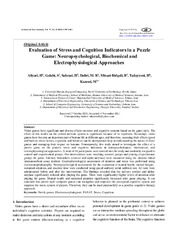Evaluation of stress and cognition indicators in a puzzle game: Neuropsychological, biochemical and electrophysiological approaches
| dc.contributor.author | Aliyari, H. | |
| dc.contributor.author | Golabi, S. | |
| dc.contributor.author | Sahraei, H. | |
| dc.contributor.author | Daliri, M. R. | |
| dc.contributor.author | Minaei-Bidgoli, B. | |
| dc.contributor.author | Tadayyonıahrab, Hamed | |
| dc.contributor.author | Kazemi, M. | |
| dc.date.accessioned | 2023-06-21T06:23:45Z | |
| dc.date.available | 2023-06-21T06:23:45Z | |
| dc.date.issued | 2022-07 | |
| dc.identifier.issn | 0365-3439 | en_US |
| dc.identifier.uri | http://hdl.handle.net/10679/8448 | |
| dc.identifier.uri | https://archrazi.areeo.ac.ir/article_126855.html | |
| dc.description.abstract | Video games have significant and diverse effects on stress and cognitive systems based on the game style. The effect of this media on the central nervous system is significant because of its repetition. Nowadays, video games have become an important part of human life at different ages, and therefore, assessing their effects (good and bad) on stress factors, cognition, and behavior can be an important help in understanding the nature of these games and managing their impact on humans. Consequently, this study aimed to investigate the effect of a puzzle game on the player's stress and cognitive indicators in neuropsychological, biochemical, and electrophysiological approaches. A total of 44 participants were entered into the study and randomly assigned to control and experimental groups. Our interventions were watching (control group) and playing (experimental group) the game. Salivary biomarkers (cortisol and alpha-amylase) were measured using the enzyme-linked immunosorbent assay method. Electrophysiological assessment of attention and stress was performed using electroencephalography. Neuropsychological assessments for the evaluation of mental health, mental fatigue, sustained attention, and reaction time were conducted using paced auditory serial addition test. All tests were administered before and after the interventions. The findings revealed that the salivary cortisol and alpha-amylase significantly reduced after playing the game. There were significantly higher levels of attention after playing the game. Mental health and sustained attention significantly increased after game playing. It can conclude that puzzle-style computer games can strengthen and empower the perceptual-cognitive system and suppress the stress system of players. Therefore, they can be used purposefully as a positive cognitive therapy approach. | en_US |
| dc.description.sponsorship | Baqiyatallah University of Medical Sciences and Presidential Soft and Identity Technologies Headquarters ; Baqiyatallah University of Medical Sciences | |
| dc.language.iso | eng | en_US |
| dc.publisher | Razi Vaccine and Serum Research Institute | en_US |
| dc.relation.ispartof | Archives of Razi Institute | |
| dc.rights | Attribution 4.0 International | * |
| dc.rights | openAccess | |
| dc.rights.uri | http://creativecommons.org/licenses/by/4.0/ | * |
| dc.title | Evaluation of stress and cognition indicators in a puzzle game: Neuropsychological, biochemical and electrophysiological approaches | en_US |
| dc.type | Article | en_US |
| dc.description.version | Publisher version | en_US |
| dc.peerreviewed | yes | en_US |
| dc.publicationstatus | Published | en_US |
| dc.contributor.department | Özyeğin University | |
| dc.identifier.volume | 77 | en_US |
| dc.identifier.issue | 4 | en_US |
| dc.identifier.startpage | 1405 | en_US |
| dc.identifier.endpage | 1411 | en_US |
| dc.identifier.doi | 10.22092/ARI.2021.356500.1855 | en_US |
| dc.subject.keywords | Cognition | en_US |
| dc.subject.keywords | Electroencephalogram | en_US |
| dc.subject.keywords | PASAT | en_US |
| dc.subject.keywords | Puzzle games | en_US |
| dc.subject.keywords | Stress | en_US |
| dc.identifier.scopus | SCOPUS:2-s2.0-85133664659 | |
| dc.contributor.ozugradstudent | Tadayyonıahrab, Hamed | |
| dc.relation.publicationcategory | Article - International Refereed Journal - Institutional PhD Student |
Files in this item
This item appears in the following Collection(s)
Share this page




